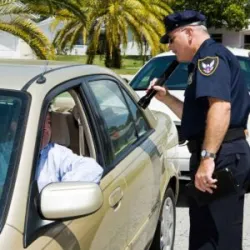
We’ve all been there – maybe you’re driving a little too fast on Highway 20 to Cartersville, maybe you rolled a stop sign downtown, and now you see the blue lights flashing behind you. The officer approaches your window, and then things take a turn. Suddenly, instead of a routine traffic stop, the officer is treating you like a suspect in a crime.
There are a number of legitimate reasons that officers may search your vehicle, but they do not automatically have that right, regardless of what they may tell you in the moment.
Law enforcement officers are bound under law to only search a vehicle or seize property when they have “probable cause.” This may be a phrase you’ve heard thrown around on your favorite T.V. show or movies, and it is a fundamental part of your rights under the constitution.
If you believe that an officer may have violated your rights, then you should not hesitate to speak to a legal professional who can help you evaluate your experience and examine the nuances of the law as they may apply to your situation.
Probable cause to perform a search a vehicle
In order to search your vehicle (or somewhere else, for that matter), an officer must either have a search warrant that specifically grants them that right, or have probable cause. But what creates probable cause?
Probable cause means that the officer can observe or otherwise reasonably believe that a something illegal is in the vehicle, or some other crime exists. For instance, if you have visible drug paraphernalia, then the officer may have probable cause to search your vehicle. There are even instances when judges have ruled that the smell of marijuana can constitute probable cause.
It is important to know that if a traffic stop escalates to an arrest, the officer may be authorized to search your vehicle once you are under arrest. This is why it is extremely important to remain as calm as possible whenever you interact with an officer, making sure to give him or her no reasons to arrest you.
Without probable cause, an officer may not search for anything that is not in plain sight in your vehicle, and may not open any closed compartments, like your trunk, without your permission – which you do not have to grant.
Get legal help to fight injustice
One needs only turn on the news to hear stories about police improperly exceeding the boundaries of probable cause. It is also important to understand that a police officer does not have to be truthful with you when you engage with him or her, so you should not rely on the officer to inform you of the boundaries of the law.
If you believe that an officer violated your rights in a traffic stop, do not hesitate to seek out proper legal counsel who can help you understand how to fight for justice. An experienced attorney will fight to protect your rights and use the strength of the law in your favor.





